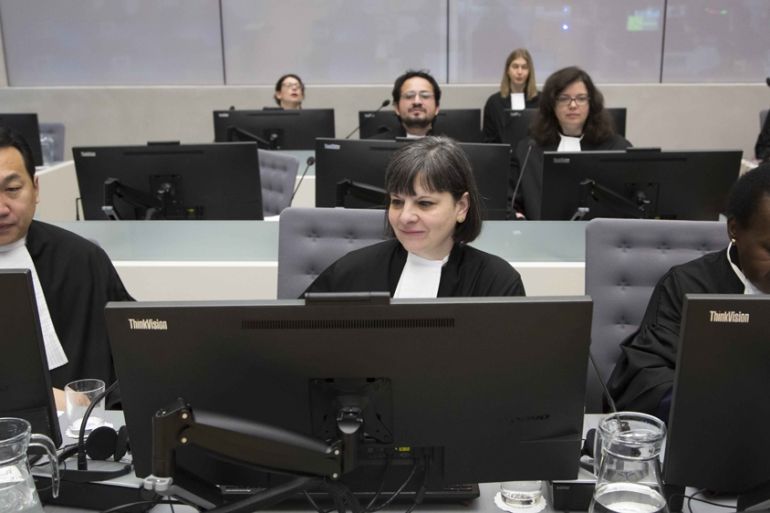Ivory Coast’s Gbagbo trial to begin at The Hague
First ICC trial against Gbagbo and Ble Goude omits victims on the other side of the 2010-2011 Ivory Coast violence.

When Paolina Massidda rises to address the judges, her voice will speak for 726 people whose wives were shot, daughters raped and houses burned.
Massidda joined the International Criminal Court shortly after it opened its doors in 2002. She participated in the first ever ICC case and has represented the interests of around 1,500 people since.
Keep reading
list of 4 items‘Mama we’re dying’: Only able to hear her kids in Gaza in their final days
Europe pledges to boost aid to Sudan on unwelcome war anniversary
Birth, death, escape: Three women’s struggle through Sudan’s war
As a legal representative of victims at the ICC, she will stand for the interests of the victims of the post-election violence that rocked the Ivory Coast in 2010 and 2011.
On Thursday the ICC will open the trial against the two alleged main perpetrators: former president Laurent Gbagbo and his ally Charles Ble Goude.
They have been charged either with four counts of crimes against humanity, namely murder, rape, persecution and other inhumane acts or – alternatively – attempted murder. After the speeches by the prosecution and the defence, Massidda will deliver her opening statement.
It is the first trial at the ICC against a former head of state and has taken more than four years to get off the ground, after Gbagbo was transferred to The Hague in November 2011.
|
|
| WATCH: Unrest escalates in Ivory Coast |
“Most people in Ivory Coast are relieved it’s starting,” Massidda told Al Jazeera. Last month she met some of her clients in Ivory Coast to prepare them for the start of the trial.
Massidda is an Italian lawyer with a warm smile and a light rolling “R”. With her small team, she oscillates between The Hague and the countries where those who experienced genocide, war crimes or crimes against humanity live.
Last year alone, she visited the Ivory Coast 12 times.
The perpetrators
In the Ivory Coast, many of her 726 clients who applied to participate in the trial were beaten in the streets, Massidda said. Some were raped; others saw members of their family murdered.
“They were targeted because they were perceived as supporters of the opposition,” she said.
The case goes deep into Ivorian politics and marks the cruel culmination of a decade-long rivalry between two men – ousted president Gbagbo and the current President Alassane Ouattara.
Gbagbo, who had been in power since 2000, considered himself the winner of the presidential elections in late 2010.
He refused to leave the presidential palace or to hand over power despite calls from the international community, which claimed opposition candidate Ouattara was the legitimate president.
Outtara was forced to govern the country from a first-floor room at the beachfront Golf Hotel in Ivory Coast’s economic capital of Abidjan, guarded by 800 UN soldiers.
Clashes between the two camps spread across the city and the country, leaving about 3,000 people dead. After several months, Ouattara’s forces were able to win power and arrest Gbagbo and his wife, Simone. She is also wanted by the ICC but has not been extradited to The Hague.
Charles Ble Goude, Gbagbo’s co-accused, was a former minister and leader of the youth league, and gained a reputation as “street general” for his ability to mobilise supporters and militias.
ICC prosecutors allege that Gbagbo and Ble Goude were the heads of an inner circle of influential people to keep Gbagbo in power “by all means”.
The two accused allegedly established a “parallel structure” to bypass the official hierarchy in the security forces and give direct orders to loyal officers.
The indictment
While more crimes were committed, the indictment relates to four specific incidents between December 2010 and March 2011.
The first is an attack on demonstrators outside the headquarters of the public broadcaster RTI, where pro-Gbagbo forces are alleged to have killed at least 33 civilians; the second, an attack on the Yopougon neighborhood which left 22 dead; the third, the firing on demonstrators at a women’s march at which seven were killed; and lastly, and the shelling of a market in Abobo which killed at least 40 people.
Ble Goude is accused of a fifth attack in April 2011.
However, the prosecutors have attracted criticism both from Ivorians and international lawyers.
“So far the focus of the ICC has been on pro-Gbagbo supporters, and hasn’t yet dealt with pro-Ouattara forces, who are [also] responsible for crimes,” said Luke Moffett, a transitional justice expert at the Queen’s University Belfast.
The ICC is the only war crimes court where victims are represented during the proceedings. While its approach has been hailed, the case in the Ivory Coast shows the limits of justice on the ground.
Only people whose suffering relates to the four incidents in the indictment are represented by Massidda, and will be compensated if a conviction is achieved.
READ MORE: President poised to cement power in Ivory Coast vote
Due to the one-sided prosecutions, “those who experienced violence by pro-Ouattara forces are currently beyond the reach of justice,” said Param-Preet Singh, of Human Rights Watch.
“There is a danger at the ICC that a hierarchy of victimhood can arise that prioritises the suffering of victims of pro-Gbagbo forces as more important in receiving justice,” Moffett explained.
A spokesperson for the Office of the Prosecutor told Al Jazeera: “The office has intensified investigations in 2015 in relation to the other side of the conflict.”
Still, the start of the trial is an “incredibly important step”, Singh told Al Jazeera. “It sends an important message that an official position as president doesn’t preclude being prosecuted.”
Follow Benjamin Duerr on Twitter: @benjaminduerr